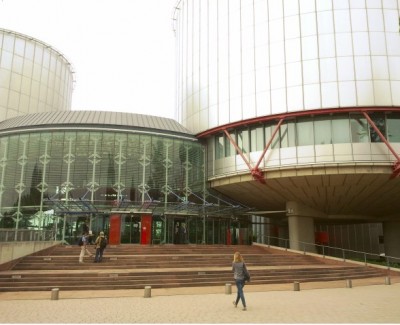 newsitems
newsitems  ECHR asserts Principles on Human Rights for the Protection of patients' Health and Life in Hospitals
ECHR asserts Principles on Human Rights for the Protection of patients' Health and Life in Hospitals
ECHR asserts Principles on Human Rights for the Protection of patients' Health and Life in Hospitals

*Strasbourg/- In a series of 3 Judgements published in a row Today, concerning Human Rights related to Health and even Life, ECHR asserted Principles guiding Medical services' Responsibilities in various delicate and complex cases of patients' Deaths, which may help to judge also several other, even more lenient cases :
- A 1st important point was that the Credibility even of an apparently comprehensive Medical Report established by Specialists, even if numerous and/or Highly Qualified, may be seriously challenged if the particular circumstances of a case clearly reveal justified Doubts or even a blatant Contradiction vis a vis real and important Facts :
F.ex., the "Independence" of a whole panel composed by eminent Specialists Medical Doctors was challenged, even if it was contardicted just by a differend conclusion by a non-specialist, because they came from the same University Faculties and/or Hospitals as an influential Professor of Medicine whose action vis a vis a patient who died in controversial circumstances had to be assessed, (see case "Bajic v. Croatia").
In consequence, even if it wasn't yet proven false, their Report wasn't judged reliable enough, mainly because, in those circumstances, it wasn't possible to exclude People's legitimate Concerns about a Risk of Collusion of interests which might not reveal the whole Truth. Thus, the State's responsibility to make a full, independent and efficient Investigation in order to find the real Causes for the Death of patient was engaged.
+ At another case, despite numerous Medical acts, and long, extensive and repeated Medical Treatments, Tests, Reports, etc., on a Prisoner condemned for Murder, who suffered from earlier Drug Addiction and HIV, added to subsequent symptoms of Tuberculosis, etc., another State's Authorities were found by ECHR to have failed to provide an "Adequate Medical care", because of certain unjustified Delays and other acts or ommissions which exposed the victim to unnecessary Health Risks, (f.ex. brief but repeated transferts to Jail Cells shared with other inmates affected by infectious diseases, etc), and, most of all, because a final Report by a team of Experts which had concluded by claiming that the victim's Health condition had evolved in a "Satisfactory" way, came just .. a few Months before he died !.. (See case of "Koryak v. Russia").
---------------------
Last but not least, ECHR judged, indirectly but clearly, that, even if an appliquant can't yet prove, not even openly claim that a State's agent might have "intentionaly killed" a victim, it's enough to simply "imply" such a possibility, in order to raise an issue concerning also the Substantial, and not only the Procedural obligations resulting from a State's duty to protect People's Human Lives, resulting in a full and extended control of its behavior, (including access to Criminal proceedings too).
But, in the opposite case, States' procedural obligation to "take approproate steps to Safeguard the Lives of those within its jurisdiction", is, in principle, fullfilled, if it "has made Adequate Provision to secure High Professional Standards among Health Professionals, and the Protection of patients' lives", even if "an error of judgement ..., or failure to coordinate by health professionals, in the treatment of a particular patient", might, eventually, reveal a "negligence" from them.
In particular, in cases of "Medical Negligence", States are "required to to set up an effective independent judicial system, so that the cause of death of patients in the care of the medical profession, ....can be determined and those responsible made accountable", ECHR confirmed.
In this regard, "Promptness and reasonable Expedition" is required, because, "even where there may be obstacles or difficulties which prevent progress in an Investigation in a particular situation, a Prompt response by the Authorities is Vital to the maintenance of Public Confidence in their adherence to the Rule of Law and to the prevention of any Appearance of Collusion in or Tolerance of Unlawful Acts".
Therefore, "the State’s obligation under Article 2 of the Convention will not be satisfied if the Protection afforded ...exists only in Theory: above all, it must also operate Effectively in Practice, and that requires a Prompt Examination of the case, without unnecessary Delays".
+ There are also "more General considerations (which) call for a Prompt Examination of cases concerning Death in a Hospital setting", because "Knowledge of the facts and of possible Errors committed in the course of Medical Care are Essential to enable the institutions concerned and medical staff to Remedy potential Deficiencies and Prevent similar Errors" in the Future, ECHR added.
=> "Therefore, the Prompt Examination of such cases is Important for the Safety of Users of all Health Services", EuroJudges stressed.
But, if there are "No grounds for any Doubts" "with regard to the Treatment administered", then, an eventual "Failure to conduct certain Examinations should have been considered a Lack of Due Diligence", only, "and Not Medical Malpractice", and, if the State concerned has made an "Investigation ..(which).. elucidated the circumstances relevant to any .. Responsibility on the part of the Medical personel for the Death" of a patient, then, it has "Dealt with the applicant’s Claim ...with the Level of Diligence Required" by that State, ECHR concluded, (in the case "Z v. Poland").
Even if these Judgements were published by Differend Sections of the ECHR, and were presented amidst various others cases, nevertheless, it's also a Fact that All 3 concern Similar issues, and were published Together Today, while being obviously complementary to each other, towards establishing CoE Member States' duties to ensure Medical Standards respectful of elementary Human Rights.
--------------
***
(NDLR : "DraftNews", as already send earlier to "EuroFora"s Subscribers/Donors. A more accurate, full Final Version might be published asap).
***
Main Menu
Home Press Deontology/Ethics 2009 Innovation Year EU endorses EuroFora's idea Multi-Lingual FORUM Subscribers/Donors FAQs Advanced search EuroFora supports Seabird newsitems In Brief European Headquarters' MAPs CoE Journalists Protection PlatformBRIEF NEWS
- 00:00 - 02.06.2021
- 00:00 - 18.10.2020
- 00:00 - 19.06.2020
- 00:00 - 18.05.2020
- 00:00 - 20.04.2020
- 00:00 - 02.02.2020
- 00:00 - 09.12.2019
- 00:00 - 27.11.2019
- 00:00 - 16.11.2019
Popular
- Yes, we could have prevented Ferguson riots says World Democracy Forum's Young American NGO to ERFRA
- Spanish People Elect CenterRIGHT Majority with 1st Party and Total of 178 MPs (6 More than the Left)
- Pflimlin's vision
- The European Athletic "Dream Team", after Barcelona 2010 Sport Championship Results
- Source Conseil d'Europe à ERFRA: Debatre Liberté d'Opposants à Loi livrant Mariage+Enfants à Homos ?
- Head of BioEthics InterGroup, MEP Peter Liese : "Embryonic stem cell research reaching its END" !?
- Spain: Jailed Turkish Terror suspect with Explosive,Drones,Chechen accomplices stirs Merah+ Burgas ?
- UN Head Ban Ki Moon at CoE World Democracy Forum : - "Listen to the People !"
Latest News
- EUOmbudsmen Conference 2022: Digital Gaps affect People's Trust threaten EF Project on EU Future ?
- French Election : Black Out on Virus, but Obligation for Fake 'Vaccines" Challenged
- Both French Presidential Candidates point at "Humanism" in crucial times...
- France : Zemmour = Outsider may become Game Changer in Presidential + Parliamentary Elections 2022
- PACE President Cox skips Turkey Worst (Occupation) case compared to Russia (DeMilitarisation) query
Statistics
Visitors: 59333650Archive
Login Form
Other Menu
(Opinion)
Paris - Bruxelles - Strasbourg, 2 septembre 2008

Le spectaculaire succès du Président français, Nicolas Sarkozy, (en tête de l'UE jusqu'a décembre), à obtenir de suite un cessez le feu inattendu entre la Russie et la Georgie, immédiatement après sa visite aux Présidents Medvedev et Saakashvili, au pire moment de tensions et heurts violents meurtieurs, qui avaient tué plusieurs innocents et provoqué le deplacement forcé de réfugiés par milliers, lui donne incontestablement une stature vraiment européenne :
A ses liens personnels bien connus avec l'Hongrie, la Grece, l'Italie ou l'Espagne, en sus de son amitié avec la chancelière allemande Merkel, son souhait d'essayer d'attirer l'Angleterre au jeu européen, etc, s'y ajoute, maintenant, une réussite, fragile certes, mais importante, au combat pour la Paix dans la "grande" Europe du général De Gaulle, "jusqu'a l'Oural", qui inclut naturellement la Géorgie, l'Arménie et d'autres pays, et ne peut exister qu'avec rapports de confiance et partenartiat stratégique avec la Russie.
Apres avoir réussi à debloquer la situation au Liban, (pays avec liens culturels historiques en Europe), lors du Sommet pour la Méditerranée à Paris, juillet dernier, (comme atteste maintenant le prémier accord d'echange d'Ambassadeurs avec la Syrie), Sarkozy activa maintenant une présidence française de l'EU bien entreprenante, à l'autre bout de l'Europe, à Moscou, où, contrairement à Napoléon, il a été reçu avec soulagement par le nouveau président russe, ami de l'experimenté Vladimir Poutine.
Cet homme politique rélativement nouveau au plan politique européen, avec une vision souvent critique ou même critiquée, à tort ou a raison, mais ambitieuse et concrete a la fois, qui aime s'adresser aux "Européens", comme il dit, n'est-il pas bien placé pour stimuler le fameux débat sur l' "Identité de l' Europe", qu'il a proposé au Parlement Européen récemment à Strasbourg, moins d'un an avant les Elections européennes de 2009 ?
En 2007, il a réussi à faire monter spectaculairement la participation citoyenne aux élections présidentielles en France, obtenant des récords historiques :
N'est-ce pas, justement ce que l' Europe a bésoin, apres 2 abstentions majoritaires sans précedent aux Elections de 1999 et 2004, et 3 "Non" aux réferenda pour ses institutions en 2005 et 2008, pendant une décennie trouble 1999-2008, (marquée surtout par la demande controversée de la Turquie d'entrer dans l'UE eclipsant les avancées de la Monnaie unique et de la liberté de circulation à l'espace Shengen, avec consequences mal-ressenties par la majorité des citoyens, bien au-délà des clivages du passé), qui a failli stopper l'integration européenne ?
Et cela, au moment même ou une globalisation galopante met l'Europe devant un choix crucial entre saut qualitatif en avant, apte à valoriser une occasion historique exceptionelle à se développer résolument, après les vaines destructions, querelles et tensions des guerres "chaudes" ou "froides" qui lui ont couté son rang dans le Monde, ou réculer définitivement en décadence...
Alors, que certains de nos amis à la Commission en Bruxelles, lui laissent au moins un peu d'espace de mouvement, et qu'ils l'aident à tenter d'insufler de l' oxygène frais et vivifiant aux rapports entre les citoyens et une Europe qui a manifestement bésoin et mérite de retrouver d'urgence un nouveau dynamisme populaire, avec un souci de réalisme mais aussi une vision passionante pour son avenir !
Après tout, les Etats Unis d' Amérique ne se sont pas faits à coups de bureaucratie, nécessaire et utile, mais manifestement insuffisante : Sans l'impulsion d'hommes politiques originaux, d'intellectuels vraiment engagés, et, surtout, sans l'enorme énergie émanant de la conscience d'enjeux à la fois pratiques et grandioses, bien resentis par des millions de citoyens, stimulant leur adhésion active comme pioniers d'un nouveau avenir commun à construire, ils seraient encore une ex-colonie périphérique, affaiblie par stériles divisions, passif et impuissant spectateur des convulsions tragiques d'un Monde à la dérive...
Que les vrais "européens" ré-lisent au moins les fameux discours historiques sur l' Europe d'un Sarkozy bien inspiré à Strasbourg, aussi bien avant qu'après avoir gagné les élections françaises, le 21 février et le 2 juillet 2007, après son 1er sommet des Bruxelles, qui a adopté le nouveau Traité de l'UE en conclusion de la presidence allémande : Bonnes lectures pour cet été 2008, afin de préparer l' avenir qui s'ouvrira (ou fermera) à partir des élections européennes de 2009.
Peut-etre revelera-t-il plus, en ce sens, lors de ses 2 discours-debats prochains avec les eurodeputés, prévus lors des sessions plenières du Parlement Européen a Strasbourg en octobre et décembre 2008...

Foreign Minister Bernard Kouchner had already unveiled President Sarkozy's intentions, during a particularly "hot" Press Conference in Paris, where he faced some's insistance for "sanctions", with a call for "a common EU stance". In the meanwhile, he was consulting "all these days" most of his EU, Russia and Georgia counterparts, (as Sarkozy's Spokesman, P-J. Henin confirmed to "EuroFora"). This allowed him to obtained the desired result, as EU Chairman, at a short, exceptional EU Summit in Brussels, afterwards.

But, Sarkozy's No 1 official, Presidential palace's Secretary General Claude Gueant, active at Elysee during the 2008 Ambassadors' Conference, (together with his Top Diplomat, the experienced David Levitte), is well known for having an overall view : A link with 2009 EU Elections at the horizon ?


















